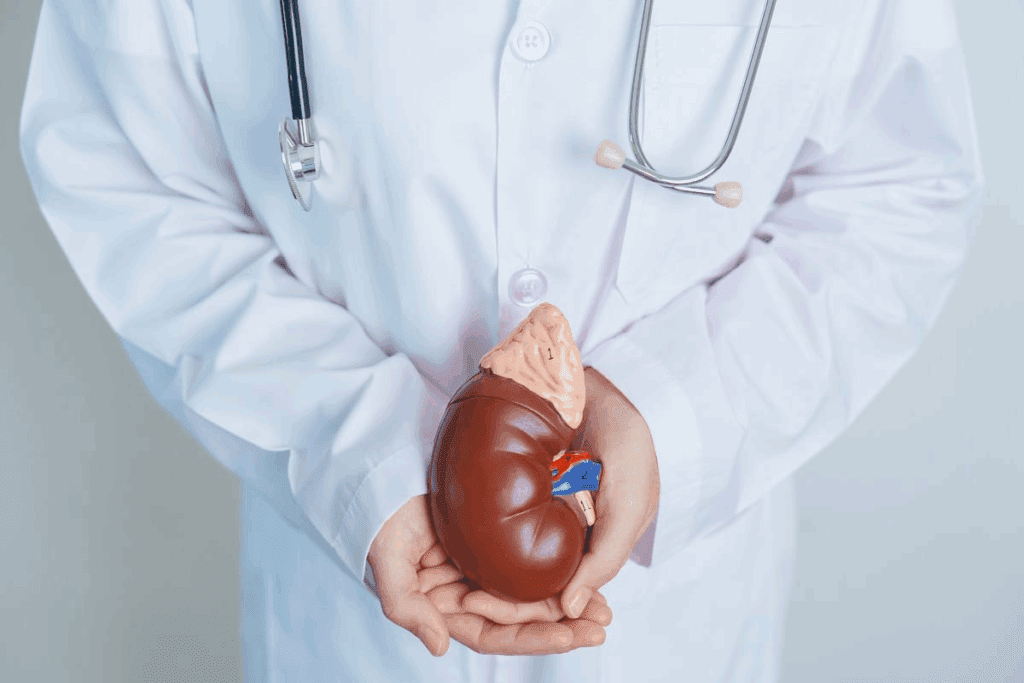Last Updated on October 31, 2025 by

Urinary tract infections (UTIs) are a common health issue. If left untreated, they can lead to severe complications. Urosepsis, a life-threatening condition, can arise from untreated UTIs, with mortality rates exceeding 40 percent in severe cases.Can you die from a UTI? Understand the serious but rare complications like sepsis that can turn a urinary tract infection fatal.
At Liv Hospital, we stress the importance of knowing when a simple bladder infection becomes a medical emergency. Our patient-centered approach focuses on early detection and rapid treatment of UTIs. This helps prevent serious complications and ensures the best possible outcomes.

A Urinary Tract Infection, or UTI, happens when bacteria infect the urinary system. UTIs are common and can affect anyone. But, they are more common in women because their urethra is shorter. This makes it easier for bacteria to get to the bladder.
Knowing about UTIs, including their causes, types, and symptoms, is key. It helps you know when a UTI might be getting worse.
UTIs are mainly caused by bacteria getting into the urinary tract through the urethra. The most common bacteria is Escherichia coli (E. coli), found in the gut. Other things that can raise your risk include poor hygiene, sex, and certain birth control.
UTIs can affect different parts of the urinary tract. The most common types are:
It’s important to know the symptoms of UTIs to get medical help quickly. Common symptoms include:
Here’s a quick look at the types of UTIs and their symptoms:
| Type of UTI | Common Symptoms |
| Urethritis | Burning during urination, discharge |
| Cystitis | Frequent urination, pelvic pain, blood in urine |
| Pyelonephritis | Fever, flank pain, nausea, vomiting |

Untreated urinary tract infections can get worse. We’ll look at how this happens and the complications that can follow.
UTIs usually start in the lower urinary tract, affecting the bladder and urethra. If not treated, the infection can move up to the kidneys. This can lead to pyelonephritis, a serious condition.
The kidneys filter waste from the blood. When they get infected, it can cause severe problems. It’s important to treat UTIs early to prevent this.
The time it takes for a UTI to spread can vary. It depends on health, underlying conditions, and the type of bacteria.
In some cases, the infection spreads quickly. In others, it takes longer. Recognizing the signs of a worsening infection is key to getting help fast.
Knowing the signs of a worsening UTI is vital. Some key indicators include:
If you notice these symptoms, seek medical help right away. Early treatment can stop the infection from getting worse and prevent long-term damage.
It’s important to know these signs and act quickly. This can greatly reduce the risk of complications from untreated UTIs.
UTIs can be deadly if not treated. Many of us know the pain of a urinary tract infection. But, we often don’t realize how serious it can get.
UTIs can turn into urosepsis or sepsis, raising the risk of death. Knowing the risks and how fast treatment is needed is key.
Untreated UTIs and urosepsis have high mortality rates. Urosepsis has a 30-day mortality rate of about 2.8 percent. Severe sepsis raises this to 4.6 percent. Sepsis shock’s mortality rate is around 40 percent.
These numbers show how urgent it is to treat UTIs quickly. Waiting too long can lead to severe conditions, making treatment harder and raising death risk.
Some factors make UTIs more deadly. These include:
Spotting these risk factors early helps doctors manage UTIs better. This can lower the chance of fatal outcomes.
Several studies show how deadly UTIs can be. For example, a study on elderly patients found delayed diagnosis and treatment greatly increased mortality risk.
Another study showed how important it is to recognize UTI symptoms in people with weakened immune systems. They are more likely to face severe complications.
These examples highlight the need for quick medical action to avoid UTI-related deaths.
Urosepsis is a serious problem that starts with urinary tract infections (UTIs). It happens when the infection spreads to the blood, becoming a life-threatening issue. This change from a local infection to a widespread one is a big worry for both patients and doctors.
Urosepsis is a form of sepsis caused by UTIs. Sepsis is a dangerous condition where the body’s fight against an infection gets out of control. It causes inflammation all over the body. Doctors say it’s very important to spot sepsis early to treat it well.
UTIs can turn into sepsis if bacteria from the urinary tract get into the blood. This can happen for many reasons, like not treating the UTI fast enough or having bacteria that antibiotics can’t kill. Older people, those with weak immune systems, and those with other health problems are at higher risk.
The death rate for urosepsis is high, showing how serious it is. Research shows that the death rate for sepsis, including urosepsis, can be between 20% and over 50% in severe cases.
“Early recognition and treatment of sepsis are critical to reducing mortality rates,” according to recent medical research.
Quick and effective treatment is key to saving lives in urosepsis cases.
It’s important for both doctors and patients to understand urosepsis. Spotting the signs of a UTI that might turn into urosepsis early and acting fast can make a big difference in patient care.
Severe UTIs can lead to organ failure if not treated quickly and effectively. This shows how critical it is to manage UTIs well. If UTIs are not treated, they can cause serious problems that harm different organs in the body.
Acute kidney injury (AKI) is a common problem from severe UTIs. AKI happens when the infection reaches the kidneys, causing damage and inflammation. This can make the kidneys work poorly, leading to a buildup of harmful substances in the body.
Risk factors for AKI in UTI patients include:
Severe UTIs can also cause sepsis, which can lead to respiratory failure. Sepsis happens when the body’s fight against an infection gets out of control. This can cause inflammation in the lungs, leading to acute respiratory distress syndrome (ARDS).
Severe UTIs can also affect the heart. The inflammation from sepsis can cause low blood pressure. This can lead to poor blood flow to important organs, causing heart problems, including heart failure in severe cases.
The brain can also be affected by severe UTIs. Sepsis can cause encephalopathy, a brain dysfunction. Symptoms can range from confusion and disorientation to coma in severe cases.
It’s important for healthcare providers to understand the complications of severe UTIs. Quick recognition and treatment of UTIs can prevent these serious outcomes.
| Organ/System | Potential Complication | Symptoms |
| Kidneys | Acute Kidney Injury (AKI) | Reduced urine output, fluid retention, electrolyte imbalance |
| Lungs | Acute Respiratory Distress Syndrome (ARDS) | Shortness of breath, hypoxemia, bilateral lung infiltrates |
| Heart | Cardiac Complications (e.g., Heart Failure) | Hypotension, tachycardia, decreased cardiac output |
| Brain | Encephalopathy | Confusion, disorientation, altered mental status |
It’s important to know which groups are more likely to face serious problems from UTIs. Some people are at a higher risk of severe complications from urinary tract infections (UTIs).
Elderly people, those over 80, face a higher risk of UTI complications. Their immune system weakens with age, and they may have other health issues. A study in the Journal of the American Geriatrics Society found UTIs are a big problem for the elderly, leading to serious health issues.
“UTIs are a major health concern among the elderly, often leading to more severe conditions such as sepsis.”
Journal of the American Geriatrics Society
People with weakened immune systems, like those with HIV/AIDS or going through chemotherapy, are at a higher risk. Their bodies struggle to fight off infections, making quick medical help essential.
Diabetes increases the risk of UTIs, and those with diabetes are more likely to face complications. High blood sugar levels make urine a perfect place for bacteria to grow.
| Risk Factor | UTI Complication Risk |
| Elderly (80+ years) | High |
| Immunocompromised | High |
| Diabetes | Moderate to High |
| Urinary Catheter Use | High |
Using urinary catheters raises the risk of UTIs. Catheter-associated UTIs (CAUTIs) are a big worry in hospitals, leading to serious problems if not handled right.
We need to identify these high-risk groups to offer them special care and prevention. Knowing the specific risks helps healthcare providers manage and prevent UTI complications better.
Administering antibiotics quickly is key to treating UTIs well. Quick treatment not only helps patients get better but also lowers the chance of death from these infections.
Waiting too long to start antibiotics can lead to a higher risk of death from UTIs. Research shows that those who didn’t get antibiotics had a 2.18 times higher risk of dying than those who did. This shows how urgent it is to act fast.
“Delayed antibiotic treatment is associated with increased mortality in patients with urinary tract infections, highlighting the need for prompt assessment and treatment.”
Source: Clinical Infectious Diseases Journal
Starting antibiotics early is vital. Early treatment helps stop the infection from spreading to the kidneys, avoiding serious problems like pyelonephritis or urosepsis.
Choosing the right antibiotic is just as critical as starting it on time. The choice should be based on the likely cause of the infection and how resistant it is to antibiotics.
| Antibiotic | Common Use | Resistance Patterns |
| Ciprofloxacin | First-line treatment for uncomplicated UTIs | Increasing resistance in some regions |
| Nitrofurantoin | Effective against E. coli | Less likely to induce resistance |
| Ceftriaxone | Used for complicated UTIs or sepsis | Reserved for severe cases due to potentially high resistance |
The length of antibiotic treatment for UTIs varies. It depends on how severe the infection is and the patient’s health. Generally, simple UTIs need a shorter treatment than more serious ones.
For very severe UTIs, like those affecting the upper urinary tract or causing urosepsis, hospital care is often needed. This allows for intravenous antibiotics and close monitoring.
In summary, quick antibiotic treatment is essential for managing UTIs well and reducing death risk. Healthcare providers must be quick to diagnose UTIs, choose the right antibiotics, and start treatment fast to improve patient results.
Knowing the signs of a UTI emergency is key. It helps you get medical help fast. UTIs can get worse quickly if not treated right away. We’ll talk about the important symptoms that mean you need to see a doctor right now.
Some symptoms mean a UTI is a serious emergency. These include:
If you have any of these symptoms, you need to see a doctor fast. This can stop things from getting worse.
If you or someone you know has severe symptoms, go to the ER right away. Waiting too long can cause serious problems, like sepsis, which is very dangerous.
| Symptom | Action |
| Severe flank pain or high fever | Visit the ER immediately |
| Vomiting or trouble keeping fluids down | Seek emergency care |
| Signs of sepsis (e.g., confusion, rapid heartbeat) | Go to the ER right away |
When you go to the doctor, tell them everything. This includes:
Sharing all this info helps doctors figure out what’s wrong and how to fix it.
By making a few simple changes, you can lower your chance of getting UTIs. It’s important to prevent UTIs to avoid serious health problems. We’ll talk about ways to stop UTIs and their complications.
Changing your lifestyle can greatly lower UTI risk. Dietary adjustments are key; eating cranberry products can help by stopping bacteria from sticking to your bladder. Also, wiping from front to back helps avoid bacterial contamination.
Other changes include avoiding harsh feminine products and wearing cotton underwear. These small steps can help a lot in preventing UTIs.
Drinking enough water is key for urinary health. Water helps flush out bacteria from your urinary tract, lowering infection risk. Drink at least eight glasses of water a day, but your needs might change based on how active you are and where you live.
| Hydration Level | Daily Water Intake | UTI Risk Reduction |
| Low | Less than 4 glasses | Higher Risk |
| Moderate | 4-7 glasses | Moderate Risk |
| High | 8 or more glasses | Lower Risk |
People at high risk, like those with diabetes or using catheters, should get regular check-ups. Early detection helps prevent complications and ensures timely treatment.
It’s important to treat UTI symptoms early. If you notice burning while urinating or need to pee a lot, see a doctor right away. This can stop the infection from getting worse and prevent serious problems.
By following these prevention tips, you can greatly reduce your risk of UTIs and their serious complications. It’s all about making smart lifestyle choices and taking care of your urinary health.
Understanding UTIs and how to prevent them is key to avoiding serious problems. UTIs are a big health issue, mainly for the elderly and those with weak immune systems.
We’ve looked at what causes UTIs, their symptoms, and the dangers they pose. Knowing the signs and acting early can help avoid serious issues.
In wrapping up, we stress the need for awareness and education about UTIs. Working with healthcare providers is essential to manage and prevent UTIs. This way, we can all take better care of our urinary health.
Yes, a bladder infection can be deadly if not treated right. It can turn into urosepsis or sepsis, which are serious and can be fatal.
UTIs can be deadly if they get worse. This is true for people who are older or have weak immune systems.
Yes, a urinary tract infection can be deadly. It can cause sepsis or other serious problems if not treated quickly and well.
Older people, those with weak immune systems, diabetes, and those with urinary catheters are at higher risk. These factors can make UTIs more deadly.
UTIs can spread to the blood, causing sepsis. This happens when the infection moves from the urinary tract to the bloodstream. It can lead to organ failure.
Urosepsis is a serious condition. It happens when a UTI turns into sepsis. This means the infection has spread to the blood and can cause organ failure.
Yes, urinary tract infections can be fatal. This is true if they are not treated quickly or if they turn into severe conditions like urosepsis or sepsis.
Signs of a UTI emergency include severe pain, high fever, and signs of sepsis. These include confusion, fast heart rate, and trouble breathing. Any severe symptoms need immediate medical help.
To prevent UTIs, keep clean, drink plenty of water, and eat right. Regular check-ups are also important for those at high risk.
Quick antibiotic treatment is key for UTIs. It helps prevent complications and lowers the risk of death from severe UTIs.
While rare, a healthy person can die from a UTI. This happens if the infection turns into sepsis and is not treated quickly and well.
Yes, a urinary tract infection can be deadly if not treated. It can lead to severe conditions like urosepsis or sepsis.
Subscribe to our e-newsletter to stay informed about the latest innovations in the world of health and exclusive offers!